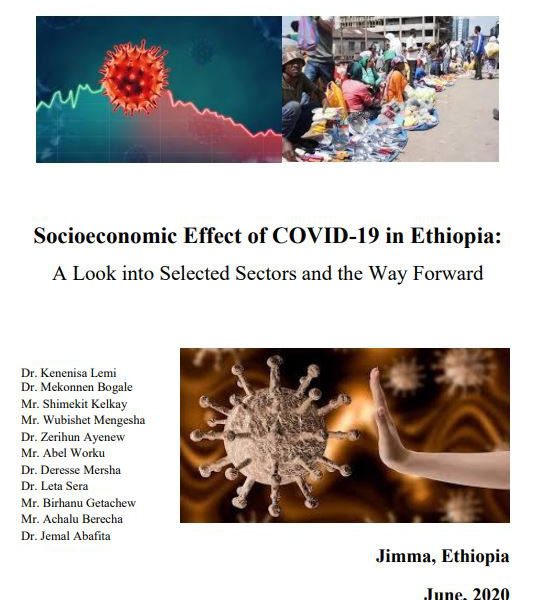A group of scholars from College of Business and Economics (BECO) of Jimma University conducted a study on socioeconomic effects of COVID-19 in Ethiopia. The study aims at forwarding expert opinions on the possible responses that help mitigate the negative impacts of the pandemic in the country. The study highlighted that the pandemic brought up clear and present negative effects such as economic hardship for consumers, businesses communities, public finance and general socio economy across the globe in general, and developing countries in particular. The uncertainty of the pandemic made it difficult for policymakers to formulate an appropriate policy response which is also exactly the case in Ethiopia. The effects of COVID-19 is also pervasive in Ethiopia due to the high rate of infection in its neighboring countries and the law level of public awareness among its citizens to comply with recommended preventive measures, the study underlines.
A through assessment is made on various key sectors of the economy by way of presenting data on existing scenario, conducting analysis and putting mitigating measures forward to be considered by policy makers. Among others, the study covered tourism and manufacturing, banking and insurance, Informal, service and education sectors. The probable impacts of the pandemic on tax administration, employment, import, export and balance of payment was also reviewed.
The scholars primarily suggested addressing the crisis from its sources by focusing on improving the health infrastructure and strengthening containment measures on the pandemic. Extending economic support and immediate economic stimulating measures are very crucial policy measures that should be undertaken by policy makers. New employment opportunity creation schemes and extending supports to firms will also help to keep the economy alive. The scholars have also suggested the importance of protecting workers in work place and facilitating immediate support for most-affected service sectors and highly risked groups.
In order to minimize the impacts of the pandemic on the education sector, the scholars called for cooperation among various stakeholders including university instructors, Ministry of Science and Higher Education, Primary and secondary schools and local governments. All the actors need to join hand to make sure that the school system remains functional at all levels irrespective of the inability to conduct face to face classes with students.
To download the complete document, use the following link:
https://www.ju.edu.et/sites/default/files/Socioeconomic%20Effect%20of%20COVID-19%20in%20Ethiopia%20A%20Look%20into%20Selected%20Sectors%20and%20the%20Way%20Forward.pdf

